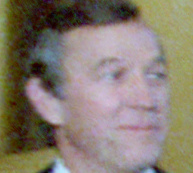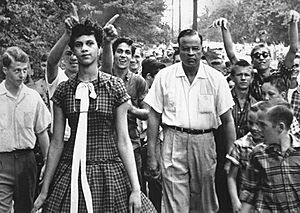Roger Mudd facts for kids
Quick facts for kids
Roger Mudd
|
|
|---|---|

Mudd at a taping of Christmas in Washington in 1982
|
|
| Born |
Roger Harrison Mudd
February 9, 1928 Washington, D.C., U.S.
|
| Died | March 9, 2021 (aged 93) McLean, Virginia, U.S.
|
| Occupation |
|
| Years active | 1953–2021 |
| Spouse(s) |
E. J. Spears
(m. 1957; died 2011) |
| Children | 4 |
Roger Harrison Mudd (born February 9, 1928 – died March 9, 2021) was an American broadcast journalist. He was well-known as a correspondent and anchor for major news networks like CBS News and NBC News. Later in his career, he became the main anchor for The History Channel.
Before that, Mudd was a weekend and substitute anchor for the CBS Evening News. He also co-anchored the weekday NBC Nightly News. He hosted popular TV shows like NBC-TV's Meet the Press and American Almanac. Roger Mudd received several important awards, including the Peabody Award and five Emmy Awards, for his excellent work in journalism.
Contents
Early Life and Education
Roger Mudd was born in Washington, D.C.. His father, John Kostka Dominic Mudd, worked as a map maker for the United States Geological Survey. His mother, Irma Iris Harrison, was a nurse in the U.S. Army Nurse Corps. She worked at the Walter Reed Hospital.
Roger went to public schools in Washington, D.C., and graduated from Wilson High School in 1945. He then studied History at Washington and Lee University, earning a Bachelor of Arts degree in 1950. One of his classmates there was the famous writer Tom Wolfe. Mudd continued his studies and received a Master of Arts in History from the University of North Carolina at Chapel Hill in 1953.
Starting His Journalism Career
Mudd began his career in Richmond, Virginia. He worked as a reporter for a newspaper called The Richmond News Leader and for a radio station named WRNL. He started at the newspaper in the spring of 1953.
At WRNL radio, Mudd read the daily noon newscast. He once had a funny moment on air when he accidentally laughed during a news report. The station later gave him his own daily show called Virginia Headlines. In 1954, Mudd briefly studied law but decided to focus on journalism instead.
Working at WTOP News

In the late 1950s, Mudd moved back to Washington, D.C.. He became a reporter for WTOP News. This news division belonged to the radio and TV stations owned by Washington Post-Newsweek. Even though WTOP News was a local station, it also covered big national stories.
Mudd started by doing the early morning newscast for WTOP. He also reported on local news for a TV show called Potomac Panorama. In 1956, he began hosting WTOP's 6:00 p.m. newscast, where he could add his own comments.
In September 1957, Mudd did his first live TV interview. He spoke with Dorothy Counts, a Black teenage girl. She had faced unfair treatment at her all-white high school in Charlotte, North Carolina, because of her race.
Time at CBS News
Roger Mudd joined CBS News on May 31, 1961. For most of his time at CBS, he was a reporter covering the U.S. Congress. He also anchored the Saturday edition of the CBS Evening News. He often filled in for main anchors like Walter Cronkite when they were away.
During the Civil Rights Movement, Mudd reported on important events. He covered the March on Washington for Jobs and Freedom for CBS on August 28, 1963. In 1964, he became nationally known for covering the long debate in Congress about the Civil Rights Act of 1964.
Mudd also reported on many political campaigns. He covered Senator Robert F. Kennedy's 1968 presidential campaign. He even interviewed Kennedy just minutes before Kennedy was assassinated in Los Angeles.
Mudd won several Emmy Awards for his reporting. These included covering the shooting of Governor George Wallace in 1972 and the resignation of Vice President Spiro Agnew in 1973. He also won two Emmys for CBS specials about the Watergate scandal.
The Ted Kennedy Interview
One of Roger Mudd's most famous interviews was with Senator Ted Kennedy. This interview was shown on November 4, 1979, as part of a CBS Reports special called Teddy. It aired just before Kennedy announced he would run for president against Jimmy Carter.
During the interview, Mudd asked Kennedy, "Senator, why do you want to be President?" Kennedy's answer was unclear and seemed unprepared. This interview raised questions about Kennedy's reasons for wanting to be president. It also led to a big drop in his public support.
Even though the Kennedy family did not want Mudd to interview them again, this interview made Mudd even more respected as a political journalist. He won a Peabody Award for this important interview.
Moving to NBC News
In 1980, Roger Mudd was considered to take over as the main anchor of the CBS Evening News after Walter Cronkite. However, CBS chose Dan Rather for the job. Mudd then decided to leave CBS News and join NBC News.
He co-anchored the NBC Nightly News with Tom Brokaw from April 1982 to September 1983. After that, Brokaw became the sole anchor. From 1984 to 1985, Mudd also co-moderated the NBC program Meet the Press with Marvin Kalb. He later co-anchored two NBC news shows, American Almanac and 1986, with Connie Chung.
PBS and The History Channel
From 1987 to 1993, Mudd worked for the MacNeil–Lehrer Newshour on PBS. He wrote essays and reported on politics. He also taught as a visiting professor at Princeton University and Washington and Lee University.
For more than ten years, Mudd was a main anchor for The History Channel. Many of his programs are still shown today. Mudd retired from full-time broadcasting in 2004. He continued to work on documentaries for The History Channel until he passed away.
Personal Life and Legacy
Roger Mudd lived in McLean, Virginia. He was married to E. J. Spears, who passed away in 2011. They had four children: Daniel, Jonathan, Maria, and Matthew. He had 14 grandchildren and two great-grandchildren.
Mudd was involved in helping others. He was a trustee for the Virginia Foundation for Independent Colleges. He helped create the "Ethics Bowl," where college students debate real-life ethical problems. He was also a trustee for the National Portrait Gallery.
In 2010, he gave $4 million to his old university, Washington and Lee University. This money helped create the Roger Mudd Center for the Study of Professional Ethics. He said he wanted to thank the university for what it had given him.
Roger Mudd passed away on March 9, 2021, at the age of 93. He died from kidney failure at his home in McLean, Virginia.
See also
 In Spanish: Roger Mudd para niños
In Spanish: Roger Mudd para niños
 | Kyle Baker |
 | Joseph Yoakum |
 | Laura Wheeler Waring |
 | Henry Ossawa Tanner |

